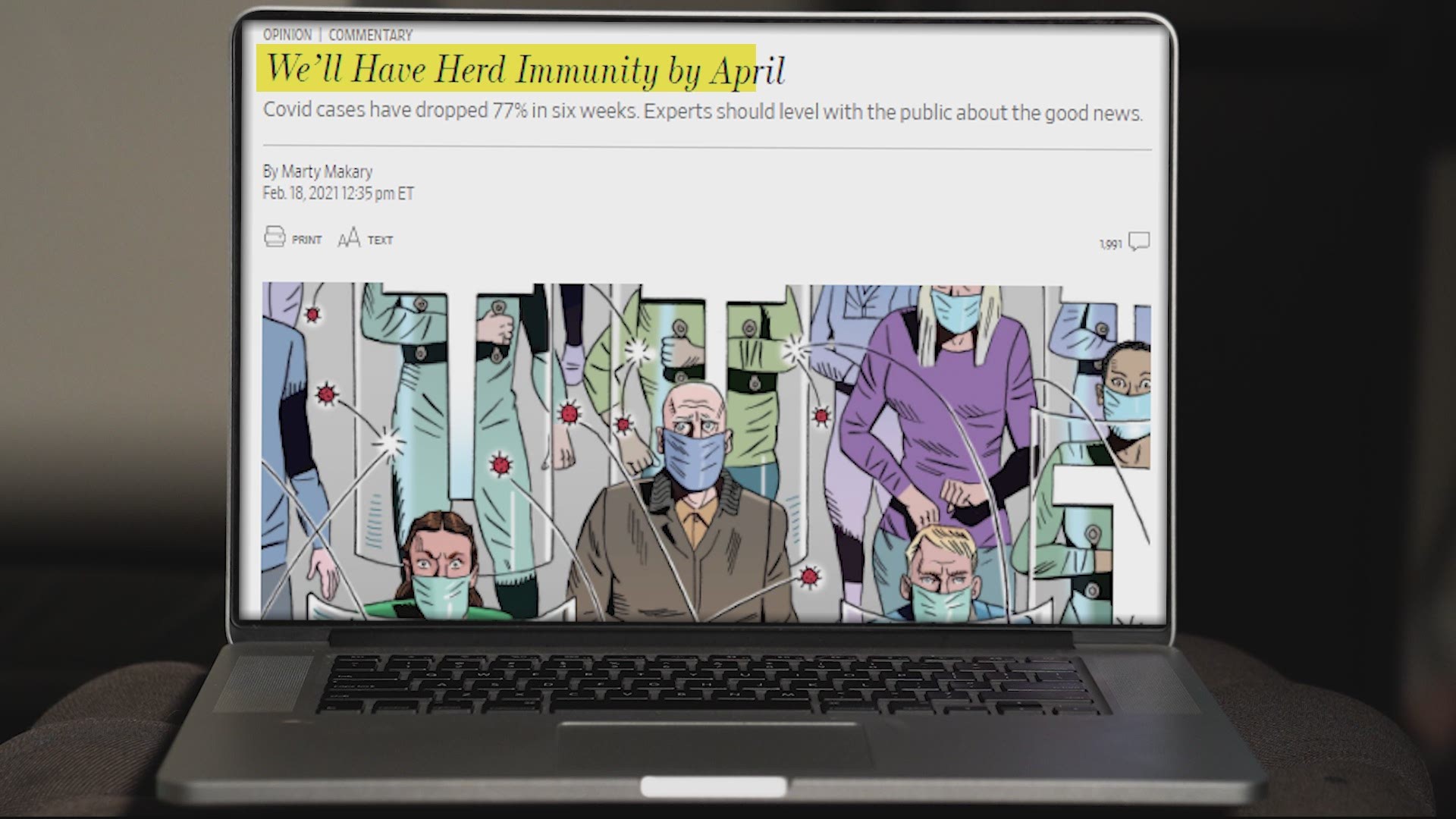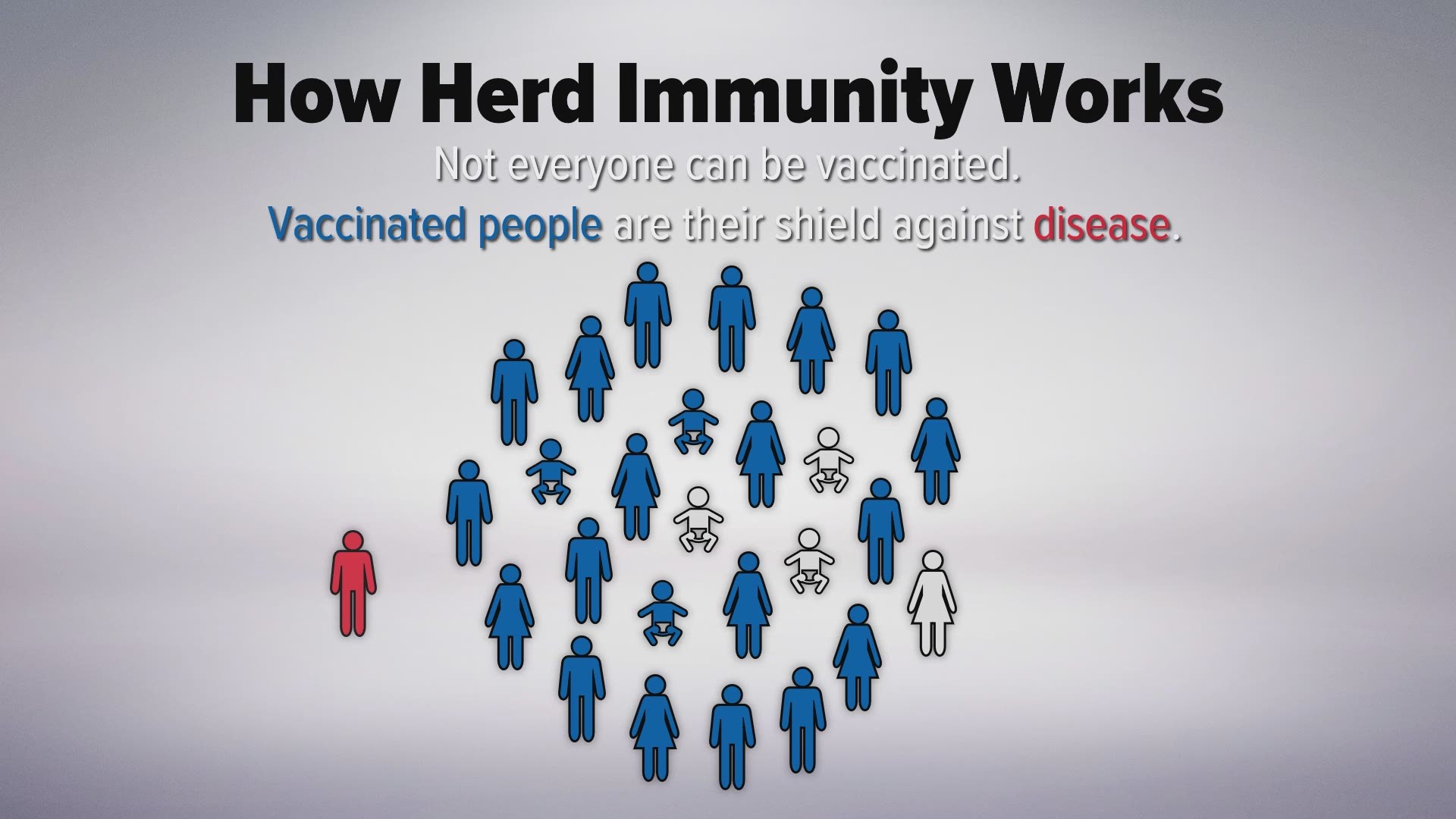WASHINGTON — THE QUESTION:
Do experts agree that we’ll reach herd immunity by April?
OUR SOURCES:
- Dr. Ali Mokdad, Chief Strategy Officer of Population Health, Institute for Health Metrics and Evaluation (IHME) at the University of Washington
- Dr. Saad Omer, Infectious Disease Epidemiologist and Director of Yale Institute for Global Health
- Dr. William Schaffner, Professor of Preventative Medicine, Vanderbilt University
- Dr. Julie Parsonnet, Professor of Medicine & Infectious Diseases at Stanford University
THE ANSWER:
No, our experts do not agree that we will reach herd immunity by April.
HOW WE GOT THERE:
“We’ll have herd immunity by April.”
That’s the bold prediction from Dr. Martin Makary, a Professor of Surgery at the Johns Hopkins School of Medicine. His Wall Street Journal op-ed published last week projects COVID will be “mostly gone” in early Spring.
Experts, as they have for months, say somewhere between 70 and 90 percent of Americans need to be fully vaccinated to reach herd immunity. At this point, CDC data shows just over 6 percent are fully vaccinated.
But Dr. Makary argues that “natural immunity” from prior COVID infection may get us to herd immunity quicker. He says “natural immunity” is far more prevalent and widespread than the current data shows.
He estimates roughly two-thirds of the U.S. population has had COVID, and roughly 55 percent of Americans have “natural immunity.”
“As more people have been infected, most of whom have mild or no symptoms, there are fewer Americans left to be infected,” Dr. Makary writes. “At the current trajectory, I expect Covid will be mostly gone by April, allowing Americans to resume normal life.”
So our Verify team asked four infectious disease specialists with decades of experience if Dr. Makary is right. All of them disagree with his timeline and, in some cases, question his logic.
Dr. Makary declined our interview request for this story.
“No, it’s not possible,” Dr. Ali Mokdad said of reaching herd immunity in April.
Dr. Mokdad is Chief Strategy Officer of Population Health at the University of Washington’s Institute for Health Metrics and Evaluation (IHME).
He points to CDC surveys that show roughly 20 percent of Americans have been infected with COVID. He predicts roughly 20 percent will be vaccinated by April.
“So the best-case scenario is the United States would be around 40 percent [immune],” Dr. Mokdad said. “That’s not herd immunity.”
Dr. Saad Omer is the Director of the Yale Institute for Global Health and an Infectious Disease Epidemiologist.
He also questioned the op-ed and, specifically, Dr. Makary’s estimate that 55 percent of Americans have “natural immunity.” Dr. Omer says there’s no way to calculate that number at this point.
“That’s not the appropriate interpretation of data,” Dr. Omer said. “There's a reason why you won't see experts who have been working on infectious disease going around making these kinds of predictions. Because there is genuine uncertainty.”
Are COVID-19 cases dropping in the US?
Dr. Makary points to the current decline in COVID cases this winter, saying it “can be explained only by natural immunity.”
But Dr. Mokdad and Dr. Omer say that’s not true. They argue data shows that human behavior has been a bigger factor in the drop in cases – as mask-wearing is trending up, and mobility (travel) is trending down.
“Americans did what it takes to bring this pandemic down,” Dr. Mokdad said. “The lockdowns and the behavior did it.”
Our experts all agree that cases and deaths should keep dropping, especially with the weather warming up. And we may see looser restrictions as a result.
But they say it does not reflect “herd immunity” and could reverse with the new, more transmissible variants.
“Even if the trends bear out, the rationale is important,” Dr. Omer said. “That reasoning tells us what happens next and what strategies we need to apply.”
“All the successes that we see right now are so fragile,” Dr. Mokdad said. “It’s so dangerous to talk about herd immunity in April and May, simply because we have new variants that are making the vaccine less effective.”
When might we see herd immunity?
As for when we’ll reach herd immunity, our experts don’t agree.
Dr. William Schaffner continues to argue we should reach that threshold in mid-to-late summer.
“Then we can blow the all-clear whistle and take off our masks and be more relaxed in our interactions with each other,” Dr. Schaffner said.
Dr. Mokdad doesn’t expect us to reach herd immunity until next winter.
“The math doesn't add up,” he said. “We don't have enough vaccines.”
Dr. Julie Parsonnet doesn’t believe we’ll ever truly reach herd immunity.
“Herd immunity is the point at which the virus cannot transmit in the population,” Dr. Parsonnet said. “It seems very unlikely that we will ever attain that point; that we will ever have enough people that are either vaccinated or natively immune to prevent any transmission in the population.”
But Dr. Parsonnet says the current decline in cases shouldn’t give us reason to skip the vaccine – just the opposite.
“We've been given this gift of time to try to get people vaccinated and to get as many people immune as we possibly can,” she said. “We need to use this time to get people vaccinated, in the event that we do have another variant that comes in, or this is just a temporary slowdown and it's going to come to rise up again.”


